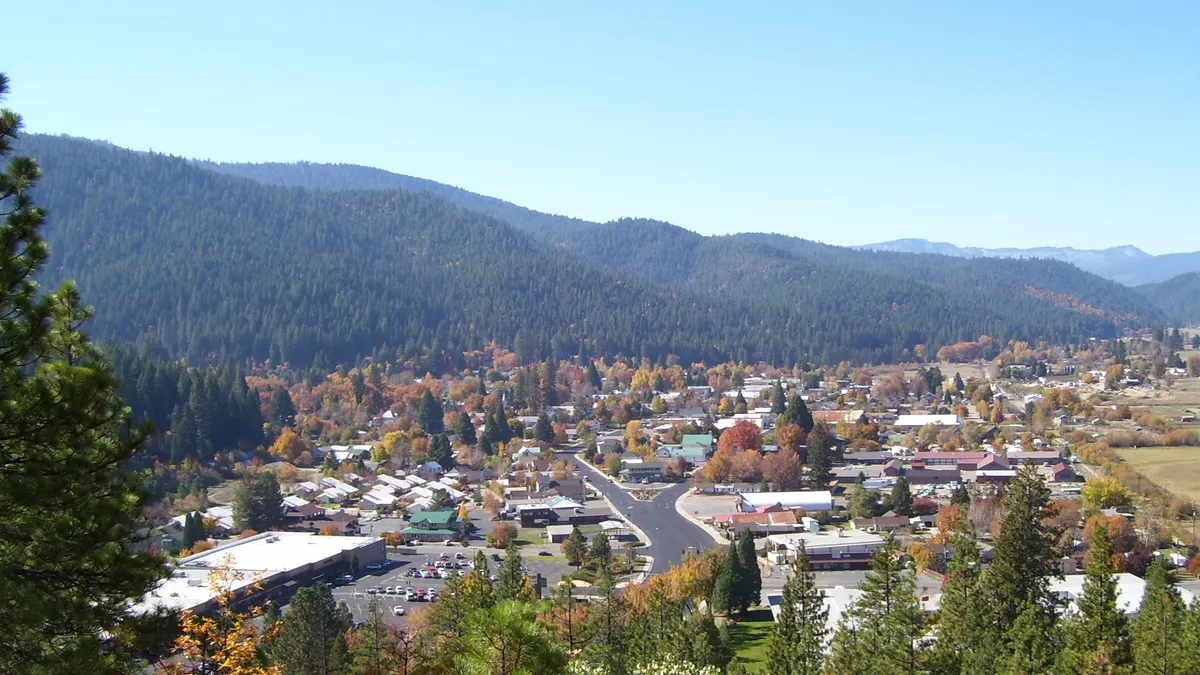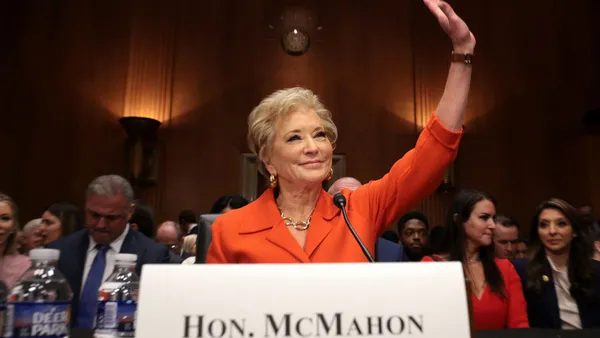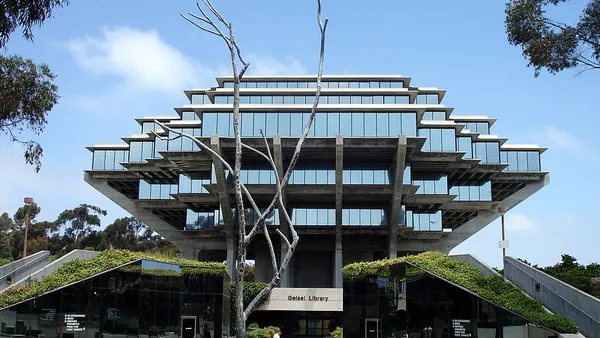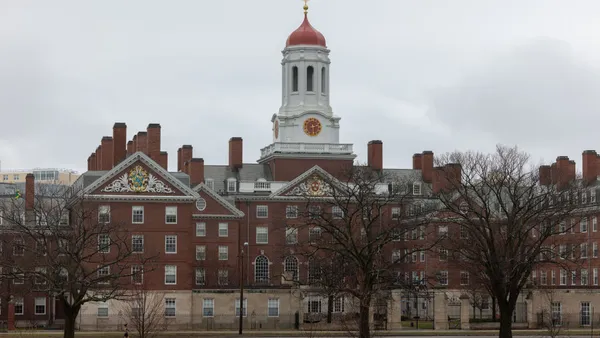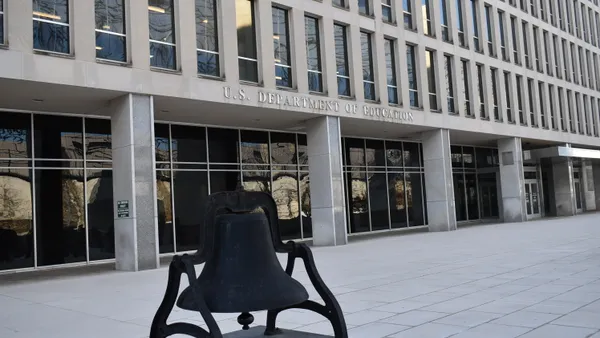In mid-April, two powerful California lawmakers urged the state's community college leaders in a letter to pause part of a pilot that allows these institutions to offer bachelor's degrees.
Fifteen California community colleges have offered four-year degrees under the pilot since at least 2017. In 2021, lawmakers greatly expanded the program, allowing the community college system to establish up to 30 new bachelor’s programs each year.
The expansion comes with an important caveat — the state’s community colleges cannot offer a four-year program already provided by the California State University or the University of California systems.
Community colleges and public four-year institutions often work together on student success and degree attainment, creating transfer pathways that help students enroll in bachelor's programs after graduating with associate degrees. But the pilot in California grants two-year colleges more power than they've traditionally had, throwing a wrench into that partnership and leading to disputes over new community college baccalaureate degrees.
State Sen. Josh Newman and Assemblyman Mike Fong — Democrats who respectively serve as the chairs of the Senate’s education committee and the Assembly’s higher education committee — on April 18 asked the California Community Colleges system to pause applications for new bachelor’s degree programs.
Pressure from Cal State likely spurred the lawmakers to make their request, according to Larry Galizio, president and CEO of the Community College League of California, which supports the pilot.
Critics of California's degree pilot say bachelor’s programs at community colleges could cannibalize students, hurting enrollment at the state’s four-year institutions. But supporters assert such offerings would reach those who otherwise wouldn't attain four-year degrees and help address workforce shortages.
A break would give leaders from California's higher education systems time to better define what counts as program duplication, improve the intersystem consultation process and create a dispute resolution process, the letter said.
Newman and Fong did not provide additional comment when asked about their letter.
As of May 4, the California Community Colleges Chancellor's Office is still reviewing the next cycle of bachelor’s degree program applications and has requested a meeting with the lawmakers, according to a system spokesperson. A working group, called for by the Cal State chancellor, has met since mid-April to create a process for four-year institutions to challenge bachelor’s degrees programs at community colleges.
The group includes California’s four-year systems — Cal State and the University of California — as well as the California Community Colleges system and the Association of Independent California Colleges and Universities, which represents private colleges in the state. It plans to meet again Thursday, the spokesperson said.
Pausing the pilot would give that working group much-needed time to improve degree implementation and processes for addressing university system objections over new programs, said Nathan Evans, deputy vice chancellor of academic and student affairs at Cal State's chancellor's office. He added that Cal State wasn’t adequately consulted when the program first launched.
"It was very much like building the plane as you're flying it," he said. "There was not that opportunity for early engagement at the statewide level."
Putting out fires
Feather River College, a rural community college in northern California, has found itself at the center of conversation around the state's pilot program.
At the beginning of last year, Feather River made a bid to offer a bachelor’s degree in applied fire management.
Amid worsening climate conditions, California is experiencing its most severe firefighter shortage in years. The Sierra Nevada mountain range, where Feather River is located, is especially hard hit.
“With the recent large-scale wildfires in California, graduates of the proposed program will provide an immediate workforce to address the impact of past and help prevent future catastrophic fires,” Kevin Trutna, president of the college, said at the time.
Cal State immediately pushed back on the application. The program, its leaders said, was too similar to fire sciences offerings at Cal Poly San Luis Obispo and one set to be offered at Cal Poly Humboldt in fall 2023.
This February, the community college system approved the plan anyway, angering Cal State leaders.
Approving the plan violated the rules of the pilot program’s expansion and ignored “earnest and ongoing” collaboration efforts, Jolene Koester, interim chancellor at Cal State, said at a March board meeting.
"That approval came despite clear programmatic duplication and in the absence of the legally required written agreement between the two segments," she said.
Out of 20-plus applications, Feather River's was the only one objected to by Cal State, according to Evans. And Humboldt was open to developing a joint bachelor's degree program with Feather River that the institutions could deliver in the Plumas County area, he said.
But according to Galizio, the Community College League of California president, Humboldt was not receptive to a dual-degree program when Feather River leadership tried to reach out before the new bachelor’s program was approved.
The program remains a point of contention. And for advocates of bachelor’s degrees at community colleges, the fire management program highlights a shortcoming of the pilot’s parameters — that there are no geographic limitations for determining whether programs are duplicative.
Cal Poly Humboldt is roughly 260 miles from Feather River, about a five-and-a-half-hour car ride. And Cal Poly San Luis Obispo is about 460 miles away, or just under an 8-hour drive.
"The idea that we should only have one program for fire management/ecosystem restoration in Northern California is, quite frankly, absurd," Galizio said. "We have 116 community colleges in California, and we have to take advantage of this capacity, especially for place-bound students and families."
A separate pool of students
The pushback to expanding the bachelor’s degree pilot program more broadly is baffling, according to Galizio.
"We are not cannibalizing students," he said. "These are, more often than not, students who would not have pursued a baccalaureate degree, were it not so affordable and in an area where they are able to attend."
Recent research from the University of California, Los Angeles' Civil Rights Project backed Galizio's assertion. It found the state's higher education systems aren't directly competing for the same students.
"Concerns of program duplication in the higher education market are greatly exaggerated, since community colleges have continuously served different student communities than the CSUs and UCs, and can help address the undersupply of qualified workers in certain industries," the research report said.
The California Community Colleges Chancellor’s Office also referenced the UCLA report when asked for comment.
Furthermore, bachelor's programs at community colleges are a tool that policymakers should seriously consider when discussing degree attainment and workforce development, according to Cecilia Rios-Aguilar, chair of the graduate education department at UCLA and lead author of the report.
"We are not serving still-large numbers of low-income students of color that could benefit from a baccalaureate degree," she said. "The state clearly also needs to produce more of these degrees, in terms of the economy."
Critics say the state should instead dedicate resources to transferring students between the state's community colleges and its four-year systems. But that pathway has proven fraught, research found.
Credit loss in the transfer process means students often spend significantly longer than two years at their new college and often exhaust their financial aid before they finish, Rios-Aguilar said. Community college students also tend to feel connected to their institutions and can worry about being accepted at larger four-year colleges, she added.
"For place-bound students, adult learners and part-time students, this is a very promising way of serving them," she said.
“We are not cannibalizing students. These are, more often than not, students who would not have pursued a baccalaureate degree, were it not so affordable and in an area where they are able to attend.”

Larry Galizio
President and CEO, Community College League of California
One of the requirements for the community college bachelor's programs is a demonstrated need for workers skilled in the field. And the Community College League of California isn’t just pushing for more degrees, Galizio said.
"We just want a process that permits the colleges to respond to labor and student demand,” he said.
Limiting accessible postsecondary options for California's students would be a gift to what Galizio described as predatory for-profit colleges. Out-of-state institutions could also benefit from their loss, he said.
"Individuals who live in California would prefer that public Californian higher education institutions should be the ones educating Californians, not preventing our institutions from doing that," he said. "If entities like Arizona State or Southern New Hampshire can come in and do what we should be doing? That'd be ridiculous."
Both Galizio and Evans expressed optimism that the college systems can resolve the tensions.
"This is one topic — an important one — but I think that we have to frame it in a bigger picture of the higher ed ecosystem in California," Evans said. "CSU and the community colleges have for decades been very strong partners."
On this, Galizio agrees, but he maintains that an undefined pause in programming isn't the answer.
"We should be able to figure this out, and we have to because people's economic and social mobility capacity can't wait,” he said. "That's why we can't delay this.”



